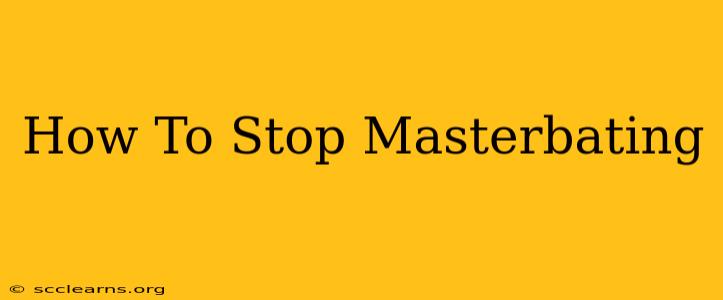Masturbation is a normal and natural part of human sexuality. However, for some individuals, it can become a source of concern, leading to a desire to reduce or stop the behavior. This isn't about judgment; it's about providing practical strategies for those who want to manage their urges and find healthier coping mechanisms. This guide offers a compassionate and comprehensive approach to understanding and addressing this personal challenge.
Understanding Your Motivation: Why Do You Want to Stop?
Before diving into strategies, it's crucial to understand why you want to stop masturbating. Are you concerned about:
- Excessive time spent: Does it feel like masturbation is consuming too much of your time and impacting other areas of your life, such as work, relationships, or personal goals?
- Guilt or shame: Do you experience negative feelings or self-judgment after masturbating?
- Relationship issues: Is your masturbation affecting your intimate relationships?
- Spiritual beliefs: Are your religious or spiritual beliefs influencing your desire to abstain?
- Other underlying issues: Could underlying anxiety, depression, or other mental health concerns be contributing to your desire to stop?
Identifying the root cause is the first step towards finding effective solutions. Addressing underlying mental health concerns is crucial; consider seeking professional help from a therapist or counselor if necessary.
Practical Strategies for Reducing Masturbation
These strategies aren't a "one-size-fits-all" solution; what works for one person might not work for another. Experiment to find what best suits your needs and preferences.
1. Identify Your Triggers
Understanding what triggers your urges is key. Common triggers include:
- Stress: High-stress levels can often lead to increased sexual urges.
- Boredom: Finding fulfilling activities can help prevent boredom-induced masturbation.
- Loneliness: Cultivating healthy relationships and social connections can be beneficial.
- Certain websites or media: Limiting exposure to explicit content can help reduce urges.
Once you identify your triggers, you can develop strategies to avoid or manage them.
2. Develop Healthy Coping Mechanisms
When an urge arises, instead of immediately resorting to masturbation, try these alternatives:
- Exercise: Physical activity is a fantastic stress reliever and can redirect your energy.
- Mindfulness and Meditation: These practices can help you become more aware of your urges without judgment.
- Hobbies and Interests: Engage in activities you enjoy – reading, painting, playing sports – to distract yourself.
- Social Connection: Spend time with friends and family.
- Journaling: Write down your feelings and thoughts.
3. Seek Support
Talking to a trusted friend, family member, or therapist can provide valuable emotional support and guidance. A therapist can help you explore the underlying reasons for your desire to stop and develop personalized strategies.
4. Set Realistic Goals
Don't try to stop completely overnight. Set small, achievable goals. For example, you might aim to reduce the frequency gradually or to use healthy coping mechanisms when urges arise.
5. Be Patient and Kind to Yourself
Changing ingrained behaviors takes time and effort. There will likely be setbacks along the way. Don't get discouraged; celebrate your progress and learn from any slip-ups.
When to Seek Professional Help
If you're struggling to manage your urges on your own, or if masturbation is significantly impacting your life, seeking professional help is essential. A therapist can provide support, guidance, and personalized strategies to address your concerns.
This guide offers a starting point. Remember, managing your sexual urges is a personal journey, and finding what works best for you requires patience, self-compassion, and potentially, professional guidance.

